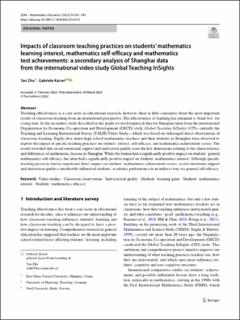| dc.contributor.author | Zhu, Yan | |
| dc.contributor.author | DR Kaiser, Gabriele Agnes Hildegard | |
| dc.date.accessioned | 2023-03-01T09:57:16Z | |
| dc.date.available | 2023-03-01T09:57:16Z | |
| dc.date.created | 2022-04-19T18:59:49Z | |
| dc.date.issued | 2022 | |
| dc.identifier.citation | Zhu, Y. & Kaiser, G. (2022). Impacts of classroom teaching practices on students’ mathematics learning interest, mathematics self-efficacy and mathematics test achievements: a secondary analysis of Shanghai data from the international video study Global Teaching InSights. ZDM: Mathematics Education, 54, 581-593. doi: | en_US |
| dc.identifier.issn | 1863-9704 | |
| dc.identifier.uri | https://hdl.handle.net/11250/3054892 | |
| dc.description.abstract | Teaching effectiveness is a core issue in educational research; however, there is little consensus about the most important results of classroom teaching from an international perspective. The effectiveness of teaching has remained a ‘black box’ for a long time. In the secondary study described in this paper we used empirical data for Shanghai taken from the international Organization for Economic Co-operation and Development (OECD) study Global Teaching InSights (GTI)—initially the Teaching and Learning International Survey (TALIS) Video Study—which was based on videotaped direct observations of classroom teaching. Eighty-five junior high school mathematics teachers and their students in Shanghai were observed to explore the impact of specific teaching practices on students’ interest, self-efficacy, and mathematics achievement scores. The results revealed that social-emotional support and instruction quality were the key dimensions relating to the characteristics and differences of mathematics lessons in Shanghai. While the former had a significantly positive impact on students’ general mathematics self-efficacy, the latter had a significantly positive impact on students’ mathematics interest. Although specific teaching practices had no significant direct impact on students’ mathematics achievement scores, social-emotional support and instruction quality considerably influenced students’ academic performance in an indirect way via general self-efficacy. | en_US |
| dc.language.iso | eng | en_US |
| dc.publisher | Springer | en_US |
| dc.rights | Navngivelse 4.0 Internasjonal | * |
| dc.rights.uri | http://creativecommons.org/licenses/by/4.0/deed.no | * |
| dc.title | Impacts of classroom teaching practices on students’ mathematics learning interest, mathematics self-efficacy and mathematics test achievements : a secondary analysis of Shanghai data from the international video study Global Teaching InSights | en_US |
| dc.type | Peer reviewed | en_US |
| dc.type | Journal article | en_US |
| dc.description.version | publishedVersion | en_US |
| dc.rights.holder | © 2022 The Authors | en_US |
| dc.source.pagenumber | 581-593 | en_US |
| dc.source.volume | 54 | en_US |
| dc.source.journal | ZDM: Mathematics Education | en_US |
| dc.identifier.doi | 10.1007/s11858-022-01343-9 | |
| dc.identifier.cristin | 2017695 | |

